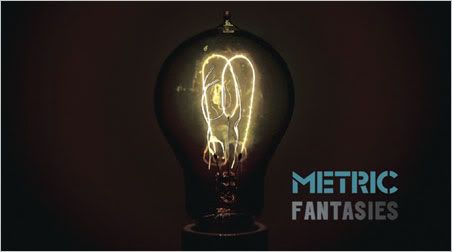
“Gold Guns Girls”
from the album Fantasies
2009
iTunes
There are stages in a band’s career that are easy targets for music critics. There’s the beginning with its exciting potential along with its unfocused clutter. Then, there’s a refinement stretch where a band taps into a specific aesthetic and runs wild with it. And, if you’re lucky enough to get by the first two stages, there’s every critic’s favorite: the stage of change. When critics run out of things to complain about with a band that has established an identity, they get upset that the band doesn’t branch out.
Metric is a perfect example of this problem: much of the criticism directed toward this band revolves around its lack of change. With three LPs that are practically indistinguishable from each other, its fourth LP Fantasies would likely provide more of the same. For fans of the band, the question isn’t how unique this album will be, but whether it’ll give the same rush as the band’s previous work.
Fantasies is filled with the same bounce as every other Metric record. The album starts with “Help I’m Alive,” a track that bottles up energy with its restrained guitars and drum samples without an appropriate release. “Sick Muse” is a pretty conventional pop rock song with predictable melodies that leave it very much lacking.
After a couple of songs that warm listeners up, “Satellite Mind” really sparks the album. The band’s lead vocalist and steadying force, Emily Haines, shines on this track without raising her voice, as her seductive whispers carry the song throughout. “Gold Gun Girls” is a thumping track with a mesmerizing chorus. However, this track is sandwiched between a couple of relatively uninteresting tracks: the slow synth tune “Twilight Galaxy,” and the predictable soft-rock track “Gimme Shelter.” The latter has some nice little namedrops but it’s not enough to keep the attention of most fans.
“Front Row” starts off with a fuzzy bassline that guides the entire song with Haines’ voice and some sparse guitar effects. The song has a nice charm to it even through its simplicity, mainly thanks to its raw feel.
“Blindness” follows and is arguably one of the best songs the band has ever done. The buildup in the song is blissful and the subtle layers added on give a euphoric effect. After a short detour detracts a bit from the song’s exhilarating feel, the song slowly melts away. An energetic little ditty called “Stadium Love” closes out the album.
While the album goes through some ups and downs, it finishes very strongly. “Collect Call” features another soothing chorus highlighted by Haines’s subdued voice. She softly sings, “Keep me closer / I’m a lazy dancer / When you move I move with you.”
No, Metric hasn’t changed much. It has developed a sound over the years that has stayed consistent and easily accessible. There are plenty of faults to find in this album, but those are faults that are likely prevalent in every Metric album. With this group, you know exactly what you’re getting, and that’s not so bad. Most bands that try and reinvent themselves usually lose the essence of what made them listenable, anyway.
Haines’ time off from the band to work on her melancholic solo project has led to Metric coming back and sounding as tight as it has ever sounded. And once you get over all of the pretense, it’s easy to see that Metric is good at making its brand of music. With this kind of reliability, fans of Metric are sure to be pleased with this album’s substance, and the tired critic gripe of lack of change won’t stop Metric from making more fun tunes.
